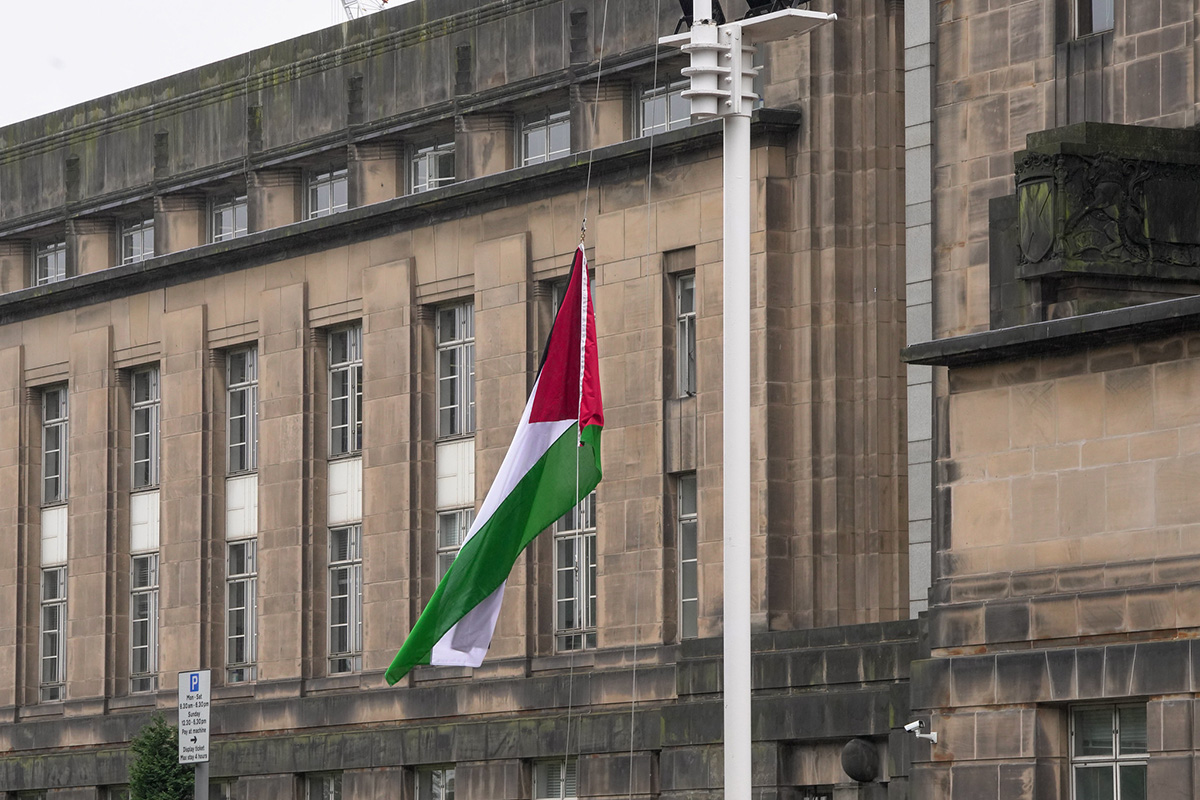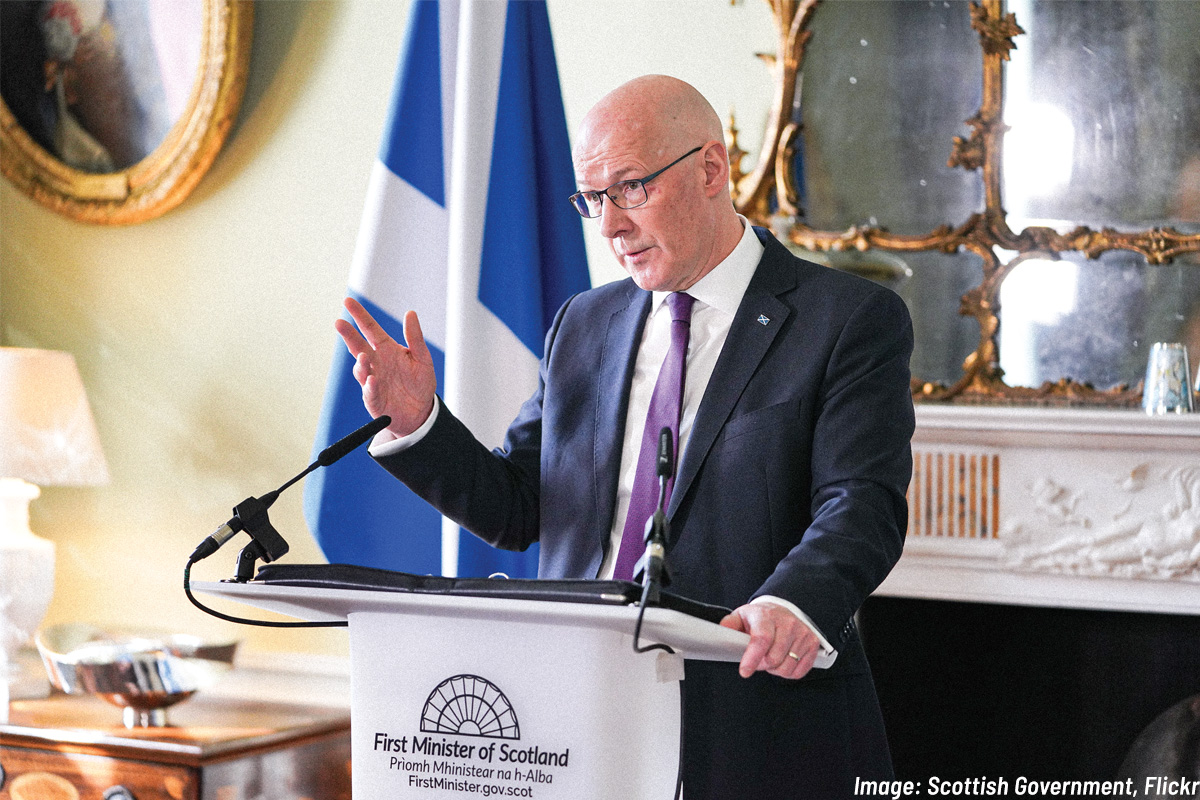Tourism is a big and important business in Scotland. These days every anniversary or holy season becomes a money spinning festival, an excuse for fireworks, with pipes playing and kilts flying. However, hardly a mention was made of the 300th anniversary, on 7th January, of the Union of the English and Scottish Parliaments.
The current widespread discontent here with both the Scottish Parliament at Holyrood in Edinburgh and the Westminster Parliament is being used by the Scottish nationalists to challenge the union and pose the issue of independence instead.
There is a mood for change which is shown in electoral term with the rise in support for the Scottish National Party (SNP) and for a referendum in Scotland to decide on independence, to go it alone from the rest of Britain. Last January an ICM poll on independence showed 51 % Yes; 36 % No; and 14% Don't know. (In June, 1998, an ICM poll showed 52% Yes, 41% No, and 7% Don't know.)
All those years of low pay for millions, housing shortages, handouts to private businesses, rising council taxes, an unpopular war plus a scandal ridden Government are the cause of this support for the nationalists. Disappointment, discontent and disgust with Labour are common to all workers in Britain.
In Scotland there is also "the Inglush" to blame and the national card is proving an attractive one to play, if the polls are representative of voters' opinion. The ICM poll also showed, in January, that the SNP have 33% and Labour 31% support. Other polls in November suggest that in the May Parliamentary elections the SNP will have 43 seats (up16), Labour 38(down 12), the Tories 14 (down 3) and the Liberals 25 (up 8), the Greens 5 (no change) and the SSP only 1 ( down 5).
Nationalism
It would be a set-back for workers in all parts of Britain, but an enormous encouragement to nationalism, if Labour was replaced as the biggest party in Scotland by the SNP. It portrays itself standing for fairness and decency. "It's time to keep health care local with directly elected health boards; to dump the student debt monster; to get rid of nuclear weapons", and work for "peace, prosperity and justice" (SNP website). An independent Scotland can flourish like "Ireland (the fourth most prosperous country in the world) or Norway (second in prosperity) or Iceland (sixth for prosperity)", and Scotland can be part of this "arc of prosperity."
The Nationalists aim for better public services by "targeting the migrant labour we need", cutting corporation tax on firms and "reducing business red tape". There would be no tax increase as revenue from North sea oil sales would provide everyone in Scotland with an additional the equivalent of £20,000 a year.
Their plans do not include public ownership, far less workers' control, but the transfer of oil tax revenue from Westminster to Holyrood. If the SNP take over, then within four years they will hold a referendum on independence. A "yes" vote would start negotiations with Westminster leading to separation and the transfer of billions of pounds of revenue from oil (and presumably whisky too). It is unlikely that the Westminster government would allow such a vast transfer of wealth or that capitalism would accept the political interference with its profit making. The independence battle would cut across all other struggles, dividing workers into their "national" tribal camps.
Together with the SNP, the Scottish Socialist Party (SSP "for socialism, independence and internationalism) and their split-off, Solidarity ("For an independent, socialist, nuclear free Scotland), have all linked together with the Scottish Greens and other groups, into a grand coalition called "Independence First". This is their number one aim.
Grim Prospects
Labour's prospects are grim. The bogey that by not voting Labour will let the Tories win doesn't frighten anyone as the Tories are already all but wiped out from the political map. They have only 17 Members in the Scottish Parliament (MSPs) and a solitary MP for bonny Galloway in the rural south-west. Labour is relying on the free bus travel for pensioners and the disabled, the free personal care, free eye examinations, greater spending on education and health with more teachers and nurses, and police, and other worthwhile, but limited achievements, as reasons for keeping Labour on top.
Voters, including Labour supporters, are not taken in because they see the increasing affluence of a few and the growing needs of the many. Private business is making a fortune out of public spending, starting with the £431million spent on the Parliament Building, Scotland's Greenwich Dome, at Holyrood, Edinburgh. With Government sleaze and the deceit felt over the Iraq war, Blair and Brown's leadership will cost Labour dear come May 3rd.
The SSP and Solidarity remain away out on the fringe of public consideration, even with a nationalist shade to their demands for public ownership of finance, resources and business, democratic control, peace and a Scotland free of nuclear bombs and nuclear power stations.
There is little to choose between the mainstream parties on their economic aims. They all generally agree on the running the economy, with minimum public intervention, more public subsidies to private business and the Liberals and SNP pledged to reduce corporation tax, presumably so profits can soar.
Coalition
A new coalition, this time of the SNP and Liberal Democrats, may take over. A majority of Liberal voters and constituency association chairpersons were reported as favouring an independence referendum. Instability and uncertainty is the most likely outcome, with any Labour-Liberal coalition hobbling along. The outcome of each Parliamentary vote would then depend on the particular issue at stake, with the views of the smaller party groups of crucial importance. The above figures do not represent a massive endorsement of nationalism at this stage, but show a huge level of abstention by Labour voters, disgusted by the Edinburgh and more so the Westminster Labour governments.
The greater use of proportional representation (PR) voting, plus the view that the parties are all the same, will result in there being no majority party to form a government on its own. It is possible that one of the newest parties, the Scottish Senior Citizens Unity party, (SSCUY), allied with the Scottish Pensioners Party in Fife, will gain enough seats to have a key influence. It has just one MSP, but has attracted many more candidates, including former leading Labour councillors and a retired T&GWU Scottish organiser.
Despite what the polls indicate, it is possible that under the PR system, Tommy Sheridan will again overcome the odds and be elected on the basis of his past and present record as a fighter for the underdog, who famously overcame the establishment. However, Sheridan will line up with the nationalists. As his statement of February 1st in the Scotsman, (Scotland 300 Nationhood Debate) explained: "Whether you think Scotland should go it alone or not, there is nothing scientific in that. It is in your heart and in your head. We think that as an independent nation, we could make Scotland a better place." He could well be rewarded with second preference votes from enough nationalists to keep his seat.
Local councils
There are two PR systems being used, one for the Parliament, where we have two votes and a different arrangement for the local councils, where there will be three or four votes to cast. The number of local councillors has been reduced and those who have decided not to stand, or who have not been elected by their party groups, have each been given between £10,000 and £20,000 as a parting gift, in compensation or in recognition for their years of civic service. You can just imagine how this pay off is viewed by voters scraping along on low pay, pensions or welfare benefits. It's hardly a vote winner!
Voter antipathy to Labour will likely produce big Labour losses by using their second vote as protest to elect a non-Labour candidate. In this way, the Nationalists and minor parties can gain seats. The out come will be a period of deals, coalitions, splits and a convenient excuse used by the Labour leaders to avoid any radical policies. Labour's change of leadership is another factor in voters' minds. If there is a coronation and not a contest, the "voting for Brown will be like voting for Blair with a Scottish accent", stated Vince Mills, from the Scottish Labour Campaign for Socialism.
Socialist policies are what are required to solve the problems facing the working people of Scotland. An opportunity to further this aim is through the success of the leadership campaign of John McDonnell. His efforts have attracted enthusiastic support where he has managed to cut through the media boycott of this campaign.
As a result of Blairism, and the failure to adopt socialist policies in Scotland, Labour is heading for big losses in May. The left within the party has been strengthened by John McDonnell's campaign. Events will serve to transform the labour movement north of the border as more and more workers realise that the only answer to nationalism is the adoption of real socialist policies. Such a programme would serve to unite workers, north and south, defeat nationalist demagogy and return a socialist government acting in the interests of all workers in Scotland, Britain and internationally.






